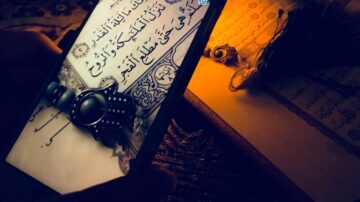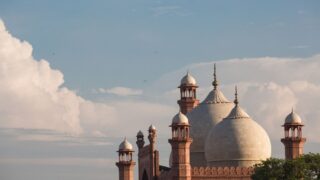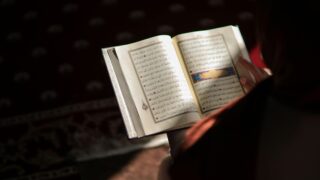(From on high, We [Allah] bestowed it [i.e. the Qur’an] on the Night of Decree. Would that you knew what the Night of Decree is! The Night of Decree is better than a thousand months. On that night, the angels and the Spirit by their Lord’s permission descend with all His decrees. That night is peace, till the break of dawn.) (Al-Qadr 97:1-5)
This surah speaks (loosely translated as “the Supreme Society,” including Allah and the angels). That night marked the beginning of the revelation of the Qur’an to Prophet Muhammad (peace and blessings be upon him), an event unparalleled in the history of humankind for its splendor and the significance it has for the life of humankind as a whole.
Its greatness is far beyond human perception. (From on high have We [Allah] bestowed it [i.e. the Qur’an] on the Night of Decree. Would that you knew what the Night of Decree is! The Night of Decree is better than a thousand months) (Al-Qadr 97:1-3).
The Qur’anic statements that relate this great event radiate with Allah’s clear and shining light: (From on high We [Allah] bestowed it on the Night of Decree) (Al-Qadr 97:1).
There is also the light of the angels and the Spirit moving between the earth and Al-Mala’ Al-A`la. (On that night the angels and the Spirit by their Lord’s leave descend with all His decrees) (Al-Qadr 97:4).
In addition, there is also the light of dawn that the Surah represents as perfectly harmonious with the light of the Qur’an and the angels as well as with their spirit of peace. (That night is peace, till the break of dawn) (Al-Qadr 97:5).
The night in question here is the same night referred to in Surat Ad-Dukhan:
(From on high We [Allah] bestowed it [i.e. the Qur’an] on a blessed night, for We would warn [humankind]; on a night when every precept was made plain as a commandment from Us. We have ever sent forth messengers as a blessing from your Lord. It is He alone Who hears all and knows all.) (Ad-Dukhan 44:3-6)
It is clearly established that it is a night during the month of Ramadan, as stated in Surat Al-Baqarah:
(It was in the month of Ramadan that the Qur’an was revealed: a guidance for humankind and a self-evident proof of that guidance and a standard to distinguish right from wrong.) (Al-Baqarah 2:185)
This means that the Night of Decree marked the beginning of the revelation of the Qur’an to the Prophet and his mission of delivering it to humankind.
Ibn Ishaq related that the first revelation of the Qur’an, consisting of the opening Surat Al-`Alaq (The Clot) took place during the month of Ramadan, when Allah’s Messenger was at his devotion in the Hiraa’ Cave:
A number of hadiths specifying this night have reached us. Some stress that it is on Ramadan 27, others on 21; a few others say it is one of the last 10 days and still some others do not go beyond saying that it is in Ramadan.
Its name, Laylat Al-Qadr, or the Night of Decree, may be taken to mean deliberate planning, management, and organization, or it may mean value, position, and rank.
Both meanings are relevant to the great, universal event of the revelation of the Qur’an and the assigning of the message to the Prophet. It is indeed the greatest and most significant event the universe has ever witnessed.
It is the event that explains most clearly how human life benefits by Allah’s planning, management, and organization. This night is better than a thousand months. The figure here and elsewhere in the Qur’an does not signify a precise number. It simply denotes something very high. Many thousands of months and many thousands of years have passed without leaving behind a fraction of the changes and results brought about during that blessed and happy night.
This night is too sublime for us to recognize: (Would that you knew what the Night of Decree is) (Al-Qadr 97:2). However, there is no reason to attach any value to the legends circulated concerning this night. It is great because Allah chose it for the revelation of the Qur’an, so that its light may spread throughout the universe, and divine peace may spread in human life and conscience.
That night is great because of what the Qur’an includes: an ideology, a basis for values and standards, and a comprehensive code of moral and social behavior; all of which promote peace within the human soul and in the world at large.
It is great because of the descent of the angels, Gabriel in particular, by their Lord’s leave, carrying the Qur’an. They fill all the space between heaven and earth in such a splendid, universal celebration, vividly portrayed in this surah.
When we look today in retrospect, after the lapse of numerous generations, at that glorious and happy night, imagine the fascinating celebration the world then witnessed, and ponder over the essence of revelation and its far-reaching effects on human life and values, we appreciate how great this event was. We can then understand, to some extent, why the Qur’anic reference to that night is made in such an equivocal way: (Would that you knew what the Night of Decree is) (Al-Qadr 97:2).
On that night every matter of significance was made plain and
distinct; new values and standards were established; the fortunes of
nations were determined; and values and standards were sorted out.
Humanity, out of ignorance and to its misfortune, may overlook
the value and importance of the Night of Decree. When humanity
does so ignore it, it loses the happiest and most beautiful sign of
grace that Allah bestowed on it.
It also suffers the loss of the real happiness and peace gifted to it by Islam, namely, the peace of conscience, family, and society. What it has otherwise gained of material civilization is inadequate compensation for its loss.
Humanity is miserable in spite of higher production levels and better means
of existence. The splendid light that once illuminated its soul has been put out; the happiness that carried it high up to Al-Mala’ Al-A`la has been destroyed; the peace that overflowed in peoples hearts and minds has disappeared. Nothing can compensate for the happiness of the human soul, the heavenly light and elevation to the loftiest ranks.
We, the believers in Islam, are commanded not to forget or neglect this event. The Prophet has taught us an easy and enjoyable way to commemorate it, so that our souls may always be in close communion with it and with the universal event that it witnessed.
The Prophet has urged us to spend this night of each year in devotion. He said, “Seek the Night of Decree in the last 10 nights of Ramadan.” (Al-Bukhari and Muslim.) He also said, “Whoever spends the Night of Decree in worship, with a pure motive of faith and devotion, will have all his past sins forgiven” (Al-Bukhari and Muslim).
Islam is not mere formalities. Hence, the Prophet specifies that the consecration of that night must be motivated by faith and devotion. This would make its consecration by any individual an indication of his or her full awareness of the far-reaching effects of what took place on that night.
The Islamic method of education and character-building links worship with faith and establishes truth in our hearts and consciences. By this method, worship is considered a means for maintaining full awareness of this truth, its clarification, and its firm establishment in our minds, hearts, and souls. This method has been proved to be the best for the revival of this truth so that it has an unfailing influence on people’s behavior.
The theoretical understanding of this truth cannot, on its own and without worship, establish it or give it the necessary impetus for its operation in the life of the individual or the society. This link between the anniversary of the Night of Decree and its consecration in faith and devotion is a part of the successful and straightforward method of Islam.
By Sayed Qutb

















